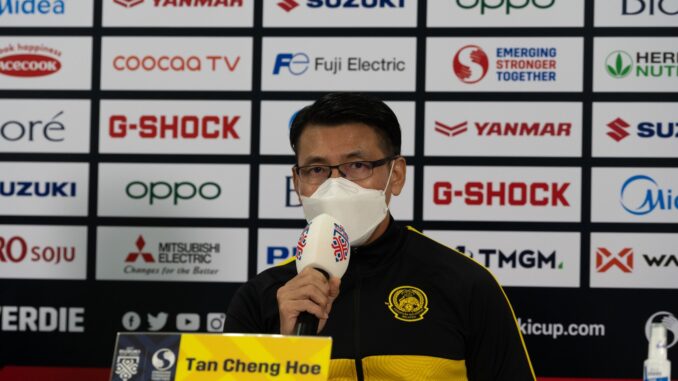
Anyone who has borne witness to the passion and noise in the grandstands at the AFF Suzuki Cup will tell you just how significant and important this regional showpiece is within Southeast Asia.
For the region of some 655 million, almost eight percent of the global population, this is their World Cup. While for most qualifying for FIFA’s global showpiece is out of touching distance – at least until the event is expanded to 48 teams in 2026 – winning the AFF Suzuki Cup is seen is a realistic target for at least a handful of the regions’ teams.
But it’s that lure of success and silverware – rare as it is in international football – that is also an Achilles heel for football within the region. Perhaps the lure and promise of winning something, anything, clouds all reasonable judgement.
We saw another example of that this week when Malaysia parted ways with popular head coach Tan Cheng Hoe, who officially resigned from his post after failing to advance from the group stage of this year’s AFF Suzuki Cup.
While on the surface that could be considered a ‘failure’ for a team that made the final in 2018, the result needs to be looked in a broader context, one which includes the fact a COVID outbreak swept through the team at this tournament, something completely outside the control of Cheng Hoe, which limited his squad selections for important matches against Vietnam and Indonesia.
“I made this decision on my own. The reason is simple, I did not achieve the target. After Christmas Day, I made my decision to leave the position,” said Cheng Hoe.
“I believe the national team need fresh air. You can see that things have not been going too well. I take full responsibility for whatever has happened.”
Since taking over the role in 2018, Cheng Hoe has overseen the rejuvenation of the Malaysian national team; a team that was in utter despair when he took over.
From the humiliation of the 10-0 defeat at the hands of the UAE in qualifying for the 2018 FIFA World Cup, to the embarrassment of not winning a game in the final round of qualifying for the 2019 AFC Asian Cup, Harimau Malaya were at their lowest ebb.
Since then, not only has Cheng Hoe has overseen regeneration of the playing talent, with the introduction of an exciting crop of young talent like Safawi Rasid and Arif Aiman, but also the playing style, introducing a much more attacking and proactive style of play.
It was a style that not only the supporters, but the players themselves embraced.
“First of all, to work with him is amazing,” national team star Brendan Gan told The Asian Game back in 2019.
“He’s got a philosophy that we all want to buy in to and I think that’s the most important part. As a player you have to buy in to what the coach wants and to be able to implement every single aspect of his instructions is so crucial to putting on good performances.
“When you talk about that UAE defeat a few years ago, that is a dull time in Malaysian football history and to come out of that with Coach Tan, I think he’s just driven into us to be fearless, just go out there and give your best, don’t be afraid to try and play football, hold onto the ball instead of our old style of football where we’d defend, defend, defend and then try to counter attack here or there, that’s always a tough style to play.
“So, for Coach Tan to implement the attacking style that we have, it’s just acting fearless which is the main point Coach Tan has given to us and I think that has shown.”
And it was showing.
Before COVID hit they were in an excellent position to advance to the final round of qualifying for Qatar 2022, eventually finishing third behind the UAE and Vietnam – but ahead of Thailand. From where they were 18 months earlier, that alone was a significant achievement.
With qualification for China 2023 due to resume in mid-year, Malaysia looked one of the clear favourites to seal one of the final eleven places to clinch their first qualification for the AFC Asian Cup since 1980 (aside from 2007 when they automatically qualified as host).
That qualification should have been the target, not regional glory, as important as that may be. Important, yes. Decisive, no.
While Cheng Hoe admits he resigned of his own accord, that he felt the need to highlights the pressure and expectation everyone feels when they compete in the tournament.
And this is far from an isolated incident. We’ve seen countless examples, including further afield in West Asia at the Gulf Cup, where coaches have paid with their job for poor results in regional tournaments.
Is that all-or-nothing attitude healthy? If nations in Southeast Asia are to truly grow and develop, do they need to reach a point where results at the Suzuki Cup are, with the greatest of respect, meaningless?
Back in 2014, albeit after having won the title, Thailand coach Kiatisuk ‘Zico’ Senamuwang spoke of the need to broaden their ambitions and aim higher than just winning the Suzuki Cup.
“We need to come out of this ASEAN shell…winning the AFF competition is not enough. We must step up and be successful at Asian level,” he said.
They were sentiments echoed by current Thai coach Mano Pölking during this year’s tournament – albeit, again, after having won the tournament.
“Today, we are proud but there’s still a lot of work in front of us. We don’t want to only win the Suzuki Cup,” said Pölking.
“That’s good for sure – to stamp our authority in the region by winning a prestigious tournament – but we want more than just to be number one in Southeast Asia. We don’t want to win this and then go to the Asian Cup or FIFA World Cup qualifiers and not have a chance.”
It was illustrative in the build-up to this year’s final between Thailand and Indonesia that Indonesian coach Shin Tae-yong, Chairman of the PSSI, Mochamad Iriawan, and Zainudin Amali, the Indonesian State Minister of Youth and Sport, all had to come out with similar statements clarifying that the Korean would keep his job irrespective of the result.
“I’m confused, who wants to replace Shin Tae-yong? His contract is for four years with the Indonesian national team. There is no instant football,” Iriawan was reported as telling Indonesian media.
With Pölking and Shin both publicly calling for more players to follow the example of Chanathip Songkrasin, Egy Maulana and Witan Sulaeman and play abroad outside Southeast Asia to improve the level of football within the region, the same theory should also apply to those making the key decisions.
For as important and prestigious as the AFF Suzuki Cup is, it’s time to look beyond it as the ultimate measuring stick. It’s time, as ‘Zico’ said, to come out of the ASEAN bubble.
Photo: AFF Suzuki Cup
Listen to Malaysian national team star Brendan Gan talk about the influence of Tan Cheng Hoe on Episode 46 of The Asian Game podcast




